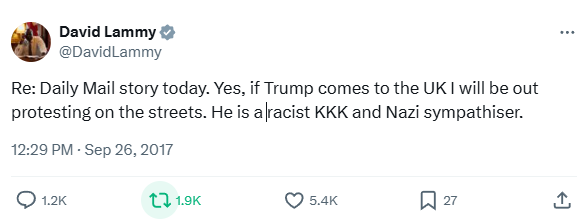After 14 years of chaos with the Conservatives, the adults are thankfully now in charge.
Now don’t get me wrong - the Tories were a complete disaster, especially in the latter few years of their reign (lettuce lady included) - but the current Cabinet is a veritable who’s who of incompetence.
Keir Starmer as PM: if Trump wins the US Presidency, we’re out in the cold for the next four years. For reference, Starmer has allowed Labour activists to campaign for Kamala Harris in the States - so Trump has made a formal complaint to the Federal Election Commission concerning 'blatant foreign interference' in the US election and 'illegal foreign campaign contributions.'
Yikes.
Then we’ve got the Angela Rayner, who can’t remember which house she was living in a few years ago. Diane Abbott, who is yet to master the abacus. Yvette Cooper, who is only capable of being interviewed if her husband is the one asking the questions.
How about Ed Miliband - the man throwing £22 billion into carbon capture and storage tech which also happens to be completely unproven - while simultaneously throwing North Sea O&G into the dumpster fire?
The same sector which will apparently fund an £8.3 billion investment into ‘GB Energy’ via an increased windfall tax of 78%, except of course this cash will never crystallise, because new licences are not being granted, and everyone’s giving up.
Then there’s our Foreign Secretary David Lammy, who among many insane comments, once tweeted out this nugget:
I’m sure that when taxes rise sharply next week, they will be spent wisely.
This brings us nicely to Rachel Reeves and the budget. Now, once upon a time, leaking policy to the press would result in an instant dismissal. Nowadays, the Chancellor leaks ideas to the press and goes for the ones which cause the least goose hissing.
In amongst a litany of truly, truly awful plans that will only destroy investment into the UK, there are concerns that Reeves is planning to remove the inheritance tax exemption on AIM shares held for more than two years before death.
The basis of this tax break is that AIM shares are in fact not truly ‘listed’ but instead simply admitted to trading on the index. This makes AIM companies qualify for business relief - and the relief could be scrapped on 30 October.
Now, before we all start panicking like the hens of Chicken Run, you do need to be careful with your assumptions. Only £6.5 billion of AIM investment is held in funds marketed towards IHT relief clients, out of the £75 billion in total. And markets are forward-looking; if AIM investors were stressed about this, the index would already have fallen substantially as a result.
Instead, we’re down by less than 1% over the past month. AIM did not collapse when taper relief was taken away, nor when other changes including prospectuses began. And while Tony Blair might think AIM should be scrapped, the index does serve a purpose - many growth companies are too small to meet the £30 million minimum market cap required of the Main Market.
Really, the real danger is that founders and families who list on AIM for business relief reasons will then de-list, or not bother in the first place. This is arguably a larger slice of the market than funds actively marketed to IHT-avoiding clients, and may have a commensurably wider effect.
On the other hand, one of the key reasons why business relief was given to AIM was so that large funds would invest in higher risk companies (skewing the risk-reward ratio). It was not designed to help wealthy individuals avoid tax without risk - and to some extent, the design of this tax relief is clearly poor.
If the intent is to encourage more investing in higher risk small cap companies, then IHT relief is a weak choice - because IHT avoidance is all about wealth preservation rather than growth, precisely the opposite of what you are trying to incentivise.
Of course, Budget Day could see a sell-off, but you can’t kill a zombie market. There will be a fire sale then a recovery. And even then, if there is a wall of sellers and no buyers, the price movement (if any) is irrelevant to the business case.
The good news is that few are holding mining stocks for IHT relief purposes - because these are higher risk and therefore not suitable for this purpose.
One real danger though is that HNW investors move even more into private companies and the massive tax advantages offered by EIS-qualifying businesses (including income tax relief, tax-free growth, loss relief, capital gains deferral, and inheritance tax relief).
And even if Reeves keeps Business Relief for now, the question is how to get AIM going again.
I have been campaigning for some time now to help change the market - and proposed the following reforms:
15 AIM market reforms
Reduce IPO prospectus requirements from hundreds of pages to a maximum of 40. Reduce listing fees to a maximum of £200,000 and ongoing annual fees to as low as practically possible.
Return auditing and ESG guidelines to their prior status. These reforms have hindered rather than helped.
Reform insider information guidelines to make communication between management and shareholders freer flowing.
Spin-off ownership of AIM off LSEG and into a separate entity, which is actually incentivised to attract new listings.
Apply a new venture capital scheme to AIM shares, boasting similar tax incentives as those offered to investors in private companies.
No capital gains tax or dividend tax for investors who buy shares in AIM companies which sport a market capitalisation under £50 million at the point of investment.
Create a tax credit scheme for pension funds, to subsidise some of the losses incurred from investing in small cap risk assets.
Companies looking to place shares have to suspend the stock until the placing is concluded, with a maximum discount of 20% to the most recent closing price.
Create a new account type, whereby investors can hold 10% of the value of their shareholding, and this cash gets preferential treatment for any placing undertaken.
Maximum spread of 5% applied to all AIM shares.
Ban on shorting for companies with a market capitalisation under £25 million, and then staged limits thereafter.
Raise the TR1 disclosure limit to 5%.
Executive managers who deliberately break market rules publicly named and shamed, and banned from being a director of any listed company for life.
Impose a maximum cash salary for directors, with additional pay beyond this only to be in a pre-set number of shares.
Marketing services, both formal and informal, to provide clear information on their success rate.
Anyone reading this Substack will almost certainly finding themselves agreeing with these ideas to some degree. The current market is not working for either companies, or investors, and something needs to change.
Unfortunately, as noted above, the only reform that the government seems to have in mind is to potentially withdraw the inheritance tax exemption on AIM shares (because removing a tax incentive when the index already has an arrow through the heel is a great idea).
There are rumours floating around that this benefit will be replaced with a new one: AIM shares held for two years will be exempt from CGT - though this would be an administrative nightmare for HMRC.
But in the longer term, I’ve changed my mind on how we should reform the AIM market. Changing the rules will simply require the same level of regulation.
And we don’t need it.
Let’s scrap all AIM market regulation. It’s a complete waste of time. Here’s what the requirements should be:
One AGM (per year)
An open and honest share structure
Audited simple annual accounts (once per year)
Everything else can go. Get rid of literally everything else.
Right now, it’s hard to get change out of £1 million a year from being listed on AIM. And what do companies get for this money?
An illiquid index where trust is at rock bottom.
What is the point of NOMADs if there is zero punishment for signing off an RNS that is factually incorrect? What is the point of regulation when directors of failed companies can skip town with (in some cases) millions of pounds of investor money in salaries?
Yes, there will be some fraud. Lots of people will lose money to unscrupulous characters. What’s new?
Imagine a world where being listed costs less than £50k per annum, or whatever it costs simply to maintain the index infrastructure to allow for trading.
No NOMADs, no lawyers, no information restriction. Inside information? What’s that? Management can say whatever they want, to whomever they want, and all you have to do is decide to invest or not based on their history.
You know how crypto is regulated? Like that. Because zero regulation will almost certainly equal significant growth.
You want to issue shares at a 90% discount after promising the Earth? Sure thing. You want to short someone into oblivion? Go for it.
There is no regulation anyway - so why are we all paying for it? And how much better off would the average AIM company be without the expense?
If we have a Wild West anyway, let’s have the growth that goes with it.






